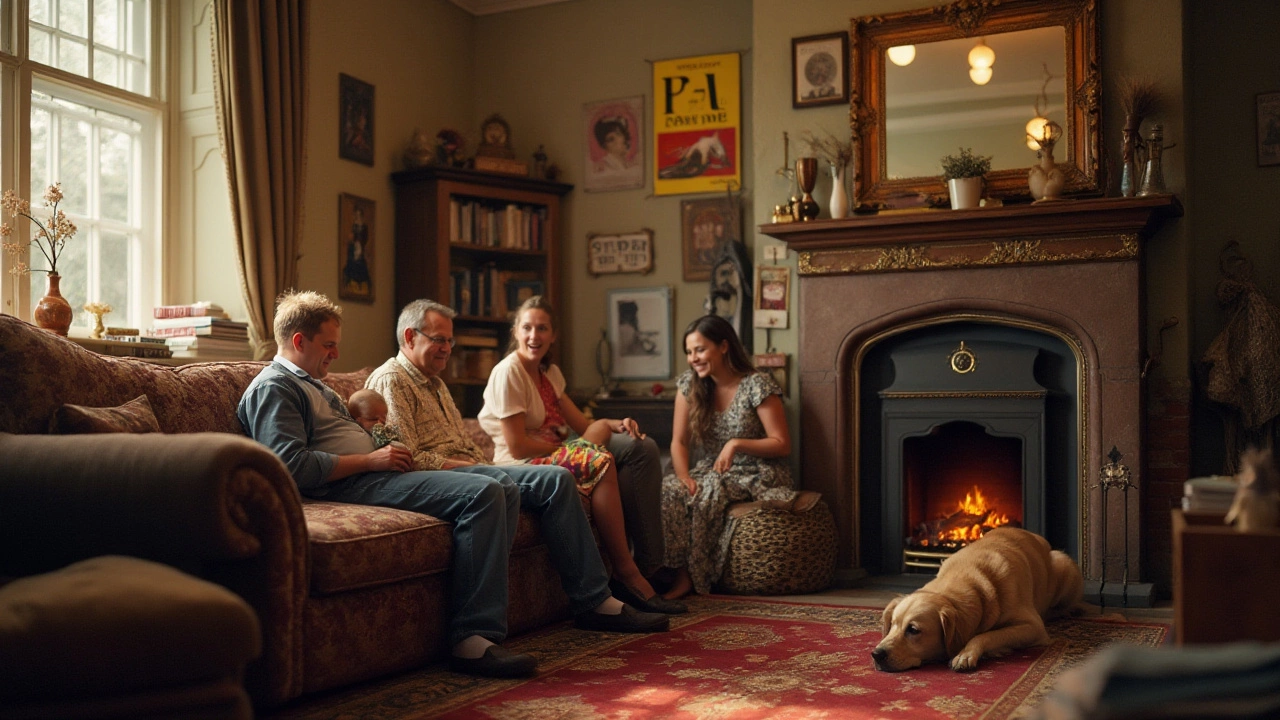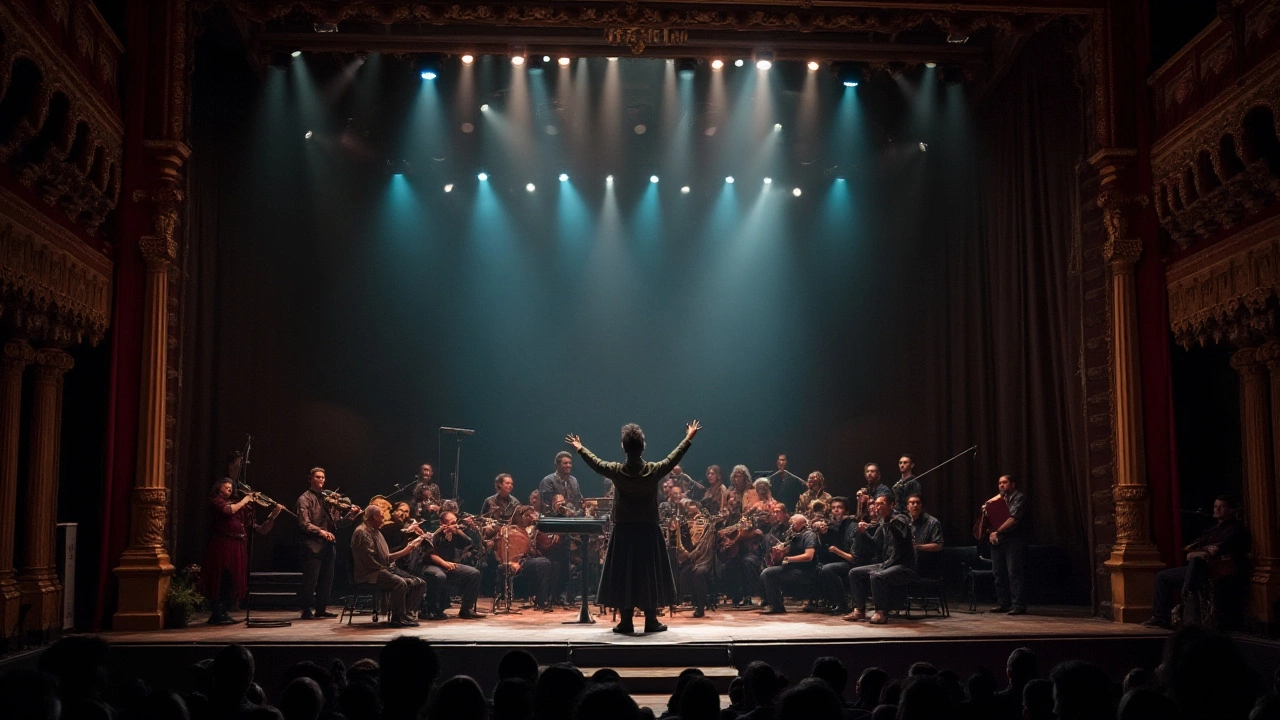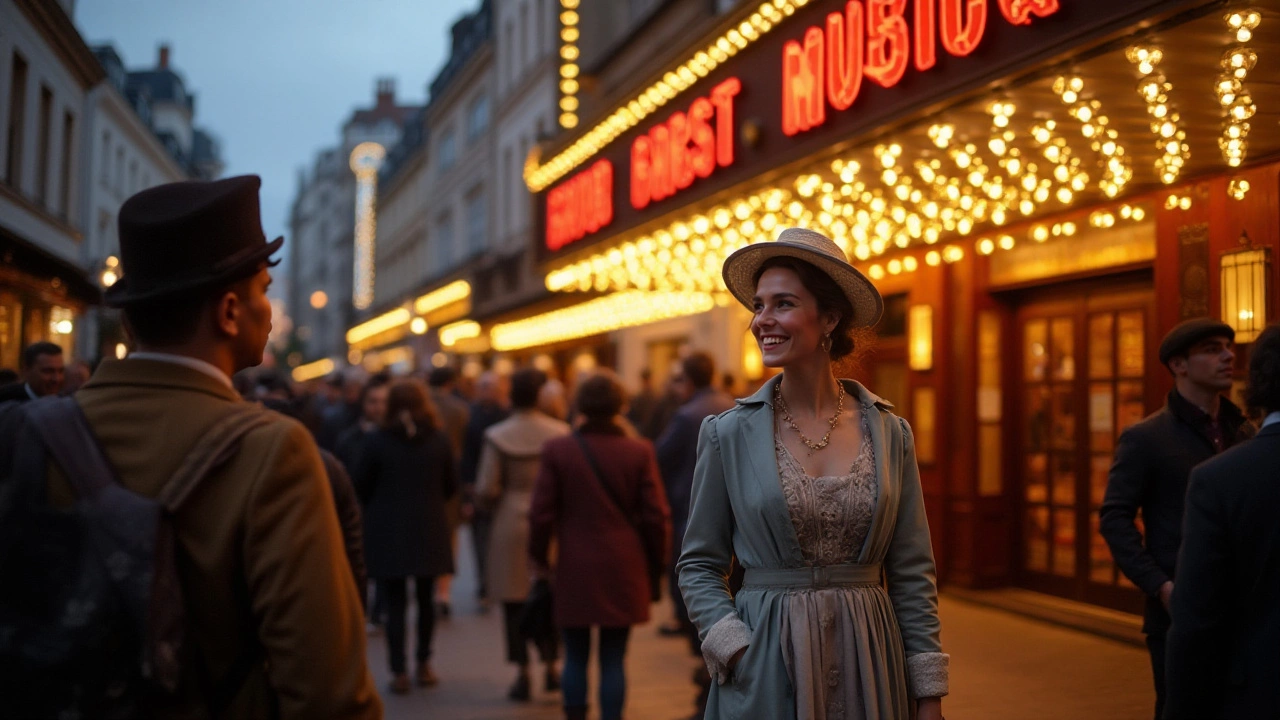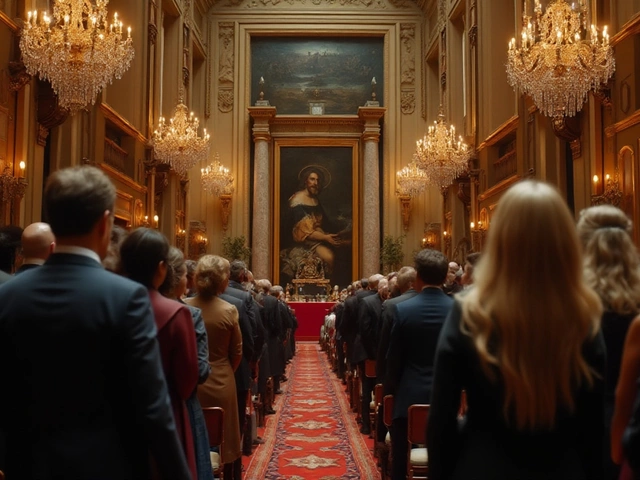Musicals hold a special place in the world of performing arts, combining narrative, music, and dance into a singular, enthralling entertainment form. For decades, audiences have flocked to see their favorite stories brought to life on stage, singing along with unforgettable tunes.
As the curtain rises, it unveils a world where every emotion is expressed through song, and every move is a dance step. In today's exploration, we'll take a journey through time and sound to uncover which musicals have captured the hearts of millions and why they remain so cherished.
Whether it's the glitz and glam of Broadway or the raw emotion of West End, these productions continue to draw crowds, proving their timeless appeal. Stay tuned as we delve into the stories behind the most popular musicals, uncovering what makes them tick and why they still hold relevance in the modern age.
- The Rise of Musicals
- All-Time Classics
- Modern Favorites
- The Global Appeal
- Factors of Popularity
- Tips for Exploring Musicals
The Rise of Musicals
The world of musicals as we know it today didn't emerge overnight. It has an intricate and vibrant history that intertwines with the evolution of theater itself. In the early 20th century, musicals began to take shape in a form that is recognizable now, though their roots can be traced back to ancient theater traditions. Key elements such as song, dance, and story were present in ancient Greek and Roman performances. However, the modern notion truly started to crystallize with the operettas of Gilbert and Sullivan. Their witty, satirical shows captivated audiences and laid the foundation for future musical comedies. Emerging from these beginnings, the genre evolved into what Noël Coward and Cole Porter would later glam up with elegance and charm.
The birth of the modern musical can be credited to great works like "Show Boat" in 1927, which marked a departure from the lighthearted numbers of operettas by introducing deeper narratives and complex characters. Integrating story and song in unprecedented ways, "Show Boat" tackled social issues and paved the way for later productions to embrace more serious themes. As World War II loomed, the 1930s saw the emergence of musicals like "Anything Goes," with catchy tunes giving audiences a much-needed escape from reality. The resilience of the genre was evident, and the audience's appetite only grew more voracious.
It was during the mid-20th century that musicals truly reached a golden era. The King of Broadway, Richard Rodgers, and his partner, Oscar Hammerstein II, revolutionized the stage with classics like "Oklahoma!," "Carousel," and "The Sound of Music." Their productions captivated audiences with memorable melodies and compelling stories that ventured past mere entertainment. Notably, "Oklahoma!," introduced innovations like the integration of dance to progress the story, which influenced countless productions that followed. Rodgers and Hammerstein weren't just entertainers; they were cultural commentators whose work mirrored society’s evolutions and struggles. As Carol Channing once said,
"Broadway is a sea around an island you just cannot conquer,"highlighting the mesmerizing draw that musicals exerted on both audiences and creators alike.
As the years rolled on, Broadway wasn't constrained to America alone. The expansion of musicals into the West End and global stages created a phenomenon that transcended borders, language, and culture. The Universal appeal of musicals, like "Les Misérables" and "The Phantom of the Opera," highlighted their ability to connect deep human emotions with large audiences worldwide. With time, the genre embraced diversity in stories and styles, welcoming rock operas such as "Jesus Christ Superstar" and "Rent" into its fold. These were productions that broke away from traditional molds and captured the pulse of the times, further solidifying the musical's place in popular culture.
The rise of musicals is not merely an evolution of entertainment; it's a reflection of society’s collective heartbeat. Each era brought with it new stories, influenced by changing social landscapes and technological advancements. From the introduction of amplified sound systems to elaborate set designs, each innovation enhanced the theatrical experience. As musicals continue to capture hearts and minds, they prove to be more than just performances — they are spectacles that mark milestones in cultural history.
All-Time Classics
When diving into the world of theater, the allure of all-time classic musicals is undeniable. These are the shows that have stood the test of time, continually captivating audiences with their charm, wit, and unforgettable melodies. At the heart of these classics is the raw emotional power they wield, effortlessly marrying story and song to evoke a wide range of feelings. From laughter and joy to heartbreak and reflection, these musicals are time-tested favorites.
One cannot delve into the discussion of classic musicals without mentioning "The Phantom of the Opera." Premiering in 1986, Andrew Lloyd Webber's masterpiece has enchanted countless theatergoers with its beautifully tragic storyline and soaring musical numbers. The show’s emotional depth is largely thanks to its unforgettable score, highlighted by the ground-shaking title song and the hauntingly beautiful "Music of the Night." Its success is reflected in its record-breaking run, making it the longest-running show in Broadway history until recently. This musical's themes of love, obsession, and the transformative power of music continue to strike a chord with audiences around the globe.
Another gem in the treasure trove of musical history is "Les Misérables," affectionately known to fans as "Les Miz." Its sweeping saga of redemption and revolution, set against the backdrop of 19th-century France, has resonated with millions since its debut. With numbers like "I Dreamed a Dream" and "Do You Hear the People Sing?" becoming almost anthemic, it's no surprise that "Les Misérables" has a devoted following. "To love another person is to see the face of God," sums up the show's core message of hope and humanity — a message that continues to inspire generations of theater lovers.
"West Side Story" offers a gripping portrayal of urban strife and doomed romance, a modern retelling of "Romeo and Juliet" set amid clashing New York City gangs. Leonard Bernstein's dynamic score and Stephen Sondheim's poignant lyrics brought to life the tensions and heartaches of young love and social division. Notable for its groundbreaking choreography by Jerome Robbins, the musical deftly blends cultural insights with universal themes, making it as relevant today as it was at its debut in 1957. A recent film adaptation testifies to its undying impact and continued relevance, attracting both new audiences and longtime fans.
The list of beloved classics could never be complete without mentioning "The Sound of Music," a musical that seemingly transcends time with its familial themes and jubilant melodies. Made famous by the film adaptation starring Julie Andrews, the show tells the story of the von Trapp family’s escape from Nazi-occupied Austria, stitching together poignant historical context with personal triumph. Songs like "Do-Re-Mi" and "My Favorite Things" are etched in the ears of audiences worldwide, standing as a testament to the warmth and resilience captured in this timeless tale. The musical's exploration of love, courage, and the enduring power of music holds a special place in the cultural zeitgeist.
Each of these popular musicals serves as a beacon of storytelling, illustrating why they are considered classics. They offer rich, emotionally charged narratives intertwined with music that has the power to lift spirits and provoke thought. They have not only carved their niche in theater history but continue to influence new generations of writers and performers, ensuring that the lights of these beloved stories never dim.

Modern Favorites
The world of musicals has evolved significantly, and today, we have a plethora of modern favorites that have captivated audiences around the globe. These contemporary classics have not only pushed the boundaries of storytelling and music but also brought fresh, innovative elements to the stage. Many of these shows have become cultural landmarks, resonating with audiences for their bold characters, unforgettable scores, and compelling narratives. From heartfelt stories to powerful music, these musicals have struck a chord with audiences of all ages, making them some of the most beloved productions of our times.
One modern favorite that has taken the world by storm is *Hamilton*. With its unique blend of hip-hop, R&B, and traditional show tunes, *Hamilton* tells the story of American Founding Father Alexander Hamilton in a revolutionary way. Created by Lin-Manuel Miranda, the musical has not only captivated audiences in the United States but has also garnered a significant international following. Its innovative storytelling has reeled in people from all walks of life, shedding light on America's past through a modern lens. A review in The New York Times described it as a "theatrical landmark" that has transformed the landscape of musical theater.
An equally influential modern musical is *Dear Evan Hansen*, which explores themes of loneliness and connectivity in the digital age. This show has touched a nerve with its heartfelt story about a high school student grappling with anxiety and the consequences of a lie that spirals out of control. The raw emotion and sincerity with which the story is told have resonated deeply, making it a standout in the contemporary musical scene. Its impact is evident not only in its critical acclaim but also in the heartfelt reactions from fans. *Ben Platt’s* portrayal of Evan won him critical acclaim, further cementing the show's place in musical history.
"Musicals have a unique ability to speak to the challenges and dreams of a generation," notes theater critic Sarah Kaufman. "They reflect social changes and bring personal stories to the forefront in ways other forms of art cannot."
Another title that has left a mark is *Wicked*, a reimagining of the Wizard of Oz story from the perspective of the misunderstood witch, Elphaba. With its sweeping music by Stephen Schwartz and a tale of friendship, courage, and acceptance, *Wicked* has become a defining musical of the modern era. Its memorable songs, such as "Defying Gravity" and "For Good," have become anthems, while its themes of identity and resistance resonate with today's audiences.
Adding to this impressive roster is *The Book of Mormon*, an audacious musical comedy from the creators of *South Park*. With its cheeky humor and surprisingly heartfelt moments, *The Book of Mormon* has entertained audiences with its unique take on faith and belief. Its success lies in its bold narrative and expert blend of humor with thought-provoking commentary, making it one of the most iconic shows of the last decade.
Across these productions, certain elements stand out as key contributors to their popularity. A modern favorite often combines relatable themes, innovative music, and striking visuals to capture audience interest. Looking ahead, these musicals set the stage for future shows to continue this creative evolution. While the landscape of musical theater continues to evolve, these modern favorites remain a testament to the enduring power and appeal of this vibrant art form.
The Global Appeal
The allure of musicals has long transcended the cultural boundaries of their birthplace. As Broadway productions began to spread internationally, they captured the imagination and hearts of theatergoers from all walks of life. The global journey of musicals, from New York City’s dazzling lights to stages across the Pacific and beyond, illustrates a phenomenon where the universal language of music and dance speaks to a shared human experience. What is it about these productions that connects so deeply with audiences worldwide? It may begin with the themes explored in various shows. Popular musicals often tap into core human emotions and experiences, crafting stories that delve into love, ambition, and the trials and tribulations of life. Such narratives are not only relatable but also resonate with audiences irrespective of their cultural background.
Moreover, the music itself plays a monumental role in this worldwide appeal. Composers like Andrew Lloyd Webber and Lin-Manuel Miranda have created scores that blend artistry with accessibility, resulting in catchy tunes and powerful ballads that linger long after the curtain falls. These melodies become a part of personal and public soundtracks, influencing everything from local adaptations to global interpretations. Additionally, technological advancements and the advent of affordable travel have brought international audiences closer to the heart of musical theater. This broadened exposure has helped shape musicals not merely as American or British phenomena but as treasured global art forms recognized and enjoyed on every continent.
"The beauty of musicals is that they allow us to transcend language barriers," said Cameron Mackintosh, a legendary producer known for hit shows. "It's the magic of music and performance that captivates us regardless of where we come from."
What also propels the global appeal is adaptations in multiple languages. Productions like The Lion King and Les Misérables have been translated into numerous languages, offering localized versions while preserving their original splendor. The adaptability of these stories and the seamless transition from one culture to another demonstrate the flexibility inherent in musicals. Local adaptations might incorporate unique cultural elements such as music styles or dance forms that add layers of depth to the storytelling experience, thus enhancing its relatability and appeal further.
| Musical | Number of Languages | Countries Performed |
|---|---|---|
| The Lion King | 9 | 22 |
| Les Misérables | 22 | 44 |
A strong contributing factor is the cross-pollination between the cinema and theater. Hollywood adaptations of stage classics bring the magic of musicals to wider audiences who may not have the opportunity to see them live. Films like "The Phantom of the Opera" and "Chicago" have translated the grandeur and emotion of stage to screen, creating fans who might later seek out the live performances, contributing to sold-out shows internationally and a bustling musical tourism industry. It's a symbiotic relationship that benefits both mediums, drawing in new fans and sustaining interest for older ones.

Factors of Popularity
When diving into the enchanting world of musicals, it becomes clear that certain shows seem to rise above others in the realm of public adoration. These popular musicals, be they classics that have stood the test of time or fresh sensations that sweep audiences off their feet, often share a collection of attributes and circumstances that propel them to the forefront of cultural consciousness. One significant factor is the relatable and emotionally resonant storylines that speak to universal human experiences, capturing imaginations and hearts across generations. These narratives often explore themes of love, ambition, conflict, and triumph, allowing audience members to see pieces of their own lives reflected on stage, thus creating a deep connection with the production.
Another contributing factor is an unforgettable score, filled with tunes that either tug at the heartstrings or compel every foot to tap along in rhythm. Memorable songs that transcend the stage can drive a musical's success, embedding themselves into the cultural zeitgeist. It's not unusual for the scores from popular Broadway shows to achieve standalone success, breaking into radio play or global charts, further cementing their legacy. For instance, "Hamilton," with its genre-bending score rooted in hip-hop, has achieved unique acclaim partly because of its innovative and compelling music. Composer Lin-Manuel Miranda once noted, "Music is the quickest way to take our feelings and transmit them to each other," encapsulating the power of a musical score in capturing and conveying emotion.
The star power of a cast can also elevate a musical's appeal and popularity. Renowned actors and actresses, with their talent and charisma, draw audiences eager to experience their performances live. When a production features an all-star lineup, the buzz and anticipation can drive audiences to theaters in droves. However, it's not just celebrity that counts—sometimes, it's a breakthrough performance from a rising star that ignites passion among theatergoers. Additionally, successful marketing and word-of-mouth buzz play crucial roles in building a musical's reputation. Social media presence, viral campaigns, and strategic media coverage can expand a show's reach beyond traditional theater audiences, attracting new fans to experience the magic first-hand.
A musical's longevity can often depend on its ability to adapt and stay relevant in changing times. Productions that reflect or comment on contemporary societal issues gain resonance with today's audiences, while also ensuring that the musical remains topical and engaging. For example, the timeless appeal of shows like "Les Misérables," with its themes of justice and resistance, continues to draw new audiences despite its historical setting, highlighting the importance of universal themes. Equally important are innovative staging and unforgettable choreography which keep the audience engaged and dazzled throughout the performance. Finally, the element of nostalgia can act as a significant allure, with audiences returning time and again to relive cherished memories.
Tips for Exploring Musicals
Embarking on a journey through the world of musicals can be nothing short of enchanting. Whether you're a seasoned audience member or a curious newbie, diving into the realm of musicals is always exciting. The first step might be to familiarize yourself with some of the quintessential productions that have defined this art form. Consider starting with legendary shows such as 'Les Misérables', 'The Phantom of the Opera', and 'Hamilton'. Each of these productions has not only accumulated various awards but also a loyal fanbase, attesting to their lingering magic on stage. By exploring these classics, you can begin to appreciate the evolution of musicals over the years and understand their significant impact on culture.
"Musicals are a fascinating blend of emotional storytelling and pasionate performance, creating an unforgettable experience that transcends language and culture." — Andrew Lloyd Webber
Take the time not only to watch but also to listen. The soundtracks of popular musicals often have a life of their own, and immersing yourself in the music can deepen your understanding and appreciation of the narratives. Platforms like Spotify and Apple Music boast extensive collections of musical soundtracks, making it easier than ever to discover your next favorite show tune. Additionally, look for documentaries and behind-the-scenes specials that delve into the creation process, offering insights into the collaborative efforts of composers, lyricists, and performers. These resources can enrich your understanding of the nuances that make each production unique.
Consider attending performances in diverse venues. While Broadway is the heart of musical theater in the United States, cities around the globe boast vibrant scenes. London's West End offers an equally prestigious lineup. Check out local productions or touring versions of big-name shows; these can provide an intimate take on beloved stories. Remember, the experience is not only about the big-name productions; smaller, experimental musicals often provide fresh and compelling stories that challenge traditional formats. By visiting independent theaters, you might just stumble upon a hidden gem that speaks to you profoundly.
Lastly, engage with the community. The world of theater is brimming with passionate fans and professionals who love sharing their experiences. Online forums, social media groups, and fan clubs are great avenues for sharing thoughts and recommendations. Participate in discussions, express your opinions on what makes a musical hit or miss, and learn from those with more experience. Engaging with a community can also mean supporting new and upcoming works, offering your patronage to fledgling artists striving to bring innovative ideas to the stage. By following these tips, you can make your exploration of the musical realm a rich and rewarding adventure, connecting with the human stories and emotions that make this medium so timeless.



